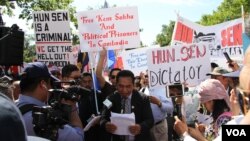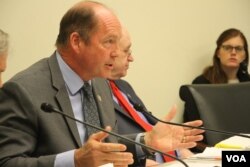As leading U.S. Congressmen are considering pressing for more sanctions against the Cambodian government over a crackdown on human rights and democracy, some Cambodian-Americans are concerned that further sanctions may not be applied.
Tung Yap, a Cambodian-American in Virginia, told VOA Khmer that companies who did not “cooperate” with the withdrawal of tax exemptions from Cambodian goods could face penalties.
“They take these issues seriously and if the announce [sanctions], I see that people will reduce their purchases of goods from Cambodia,” he said.
Saray Yuorn, a Cambodian-American from Tacoma, said congress had the power to restrict goods imports from Cambodia and that he personally would not use Cambodian products as he sees it as supporting violations of human rights and democracy.
“Fairly speaking, we cannot buy and use goods made from the sweat and blood of the workers to wear. That’s just like we are wearing the blood of the workers,” he said.
He added that he felt sympathy with workers who could be impacted by any economic sanctions against Cambodia.
U.S. congressmen in recent weeks held a hearing to assess new ways of applying sanctions on the government of Prime Minister Hun Sen over its crackdown on the opposition, media and civil society.
In the hearing, led by Ted Yoho, a Republican representing Florida, new measures including targeting officials, corporations, freezing assets and placing prohibitions on garment imports were discussed.
Brad Sherman (D-Cal), said it was time that Washington approached American businesses and the European Union and Japan.
“If we decide to forego the special access to the U.S. market that any company buying garments from Cambodia can immediately void this contract, and so we can put that in the matter of law.”
Schanley Kuch, a Cambodian resident of Maryland, blamed the Cambodian government if the Western countries imposed sanctions.
“The US and EU, they don’t want to stir up things or create conflict ...So the pressure from the U.S. And E.U. This time is a very important and practical one,” he said.
In a letter to the Cambodian labor minister, Ith Sam Heng, U.S. retail giant Walmart warned that its investment in Cambodia “depends on a strong business environment.”
“Stability, predictability and rule of law from a cornerstone of our business engagement around the world and allow us to make long-term commitments and investments in a market,” Scott Price, executive vice president of Walmart, told Sam Heng in the letter, dated December 6.
“As we are held to this high standard, we respectfully ask that your government continue to improve working conditions for Cambodia factory workers and treat our government and civil society with fairness, in accordance with international standards and norms.”
Ath Thorn, president of the Coalition of Cambodian Apparel Workers Democratic Union and head of the Cambodian Labor Confederation, said there would be serious implications of any economic action against Cambodia.
“So other countries cannot replace [the US and EU] especially China that has a long and good relationship with the government. It does not import Cambodian goods at all, but just imports raw materials to Cambodia and produces things for export only,” he said.










